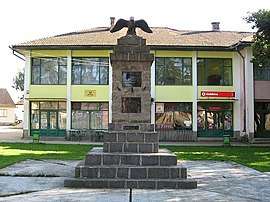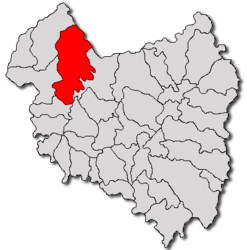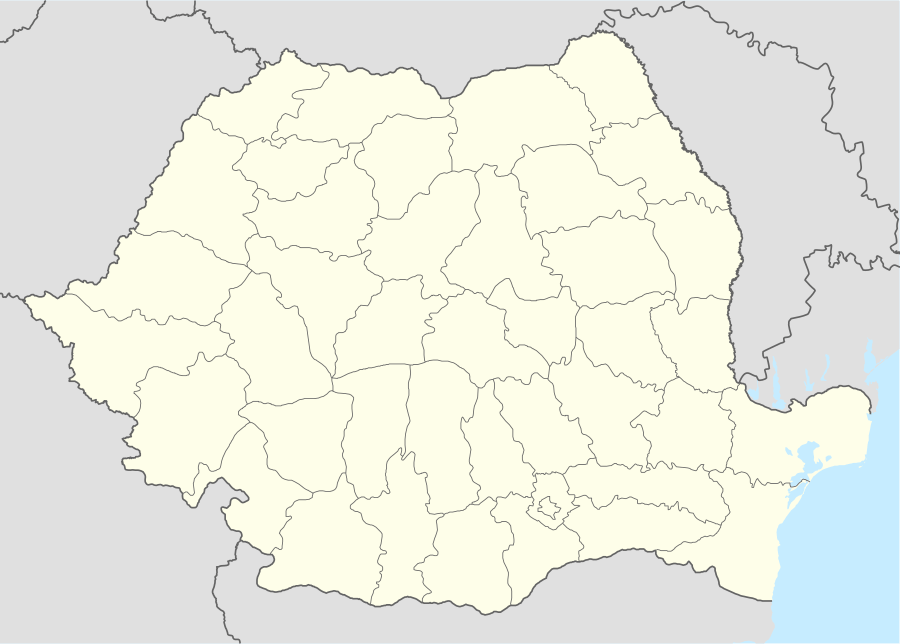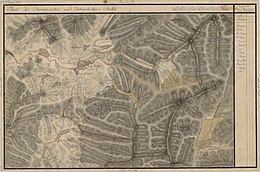Bățani
Bățani (Hungarian: Nagybacon, Hungarian pronunciation: [nɒɟbɒtson]) is a commune in Covasna County, Transylvania, Romania. It lies in the Székely Land, an ethno-cultural region in eastern Transylvania.
Bățani Nagybacon | |
|---|---|
 Millecentennial monument | |
 Location in Covasna County | |
 Bățani Location in Romania | |
| Coordinates: 46°5′22″N 25°41′29″E | |
| Country | |
| County | Covasna |
| Government | |
| • Mayor | Csaba Bardócz (UDMR) |
| Population (2011)[1] | 4,403 |
| Time zone | EET/EEST (UTC+2/+3) |
| Vehicle reg. | CV |
Component villages
The commune, with its center at Bățanii Mari, is composed of five villages:
| In Romanian | In Hungarian |
|---|---|
| Aita Seacă | Szárazajta |
| Bățanii Mari | Nagybacon |
| Bățanii Mici | Kisbacon |
| Herculian | Magyarhermány |
| Ozunca-Băi | Uzonkafürdő |
Demographics
During the 2002 census, it had a population of 4,501, of which 3,962 of its inhabitants, or 88.02%, were ethnic Hungarians.
According to the 2011 census, it has a population of 4.403 of which 83.08% are ethnic Hungarians, 12.24% are Roma people and 1.41% Romanians. For 3.27% of the population, the ethnicity is unknown.[2]
From a confessional point of view, most of the inhabitants are Reformed (75.15%), but there are also minorities of Pentecostals (11.83%), Roman Catholics (4.61%) and Orthodox (2.09%). For 3.5% of the population, the confessional affiliation is not known.[3]
History

During World War II, ethnic conflicts took place in this area. After switching sides, the Romanian Army attacked Hungary and entered Northern Transylvania, on 4 September 1944, around 40 Romanian soldiers were tortured and killed by the defending Hungarian or German Army in Szárazajta (Aita Seacă).[4] On 26 September 1944, members of the irregular paramilitary Maniu Guard led by Gavril Olteanu massacred thirteen Székelys in Aita Seacă village.[5][6]
References
- "Populaţia stabilă pe judeţe, municipii, oraşe şi localităti componenete la RPL_2011" (in Romanian). National Institute of Statistics. Retrieved 4 February 2014.
- http://www.recensamantromania.ro/wp-content/uploads/2013/07/sR_Tab_8.xls
- http://www.recensamantromania.ro/wp-content/uploads/2013/07/sR_TAB_13.xls
- https://adevarul.ro/locale/botosani/cum-s-au-macelarit-secuii-romanii-urma-72-ani-misterele-carnagiului-aita-seaca-teroarea-declansata-apoi-1_58457cc55ab6550cb8234847/index.html
- The Aita Seacă (Szárazajta) massacre (in Hungarian)
- Cum s-au măcelărit secuii cu românii în urmă cu 72 de ani. Misterele carnagiului de la Aita Seacă şi teroarea declanşată apoi
